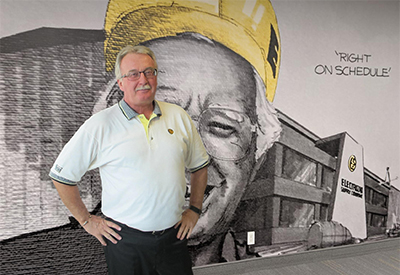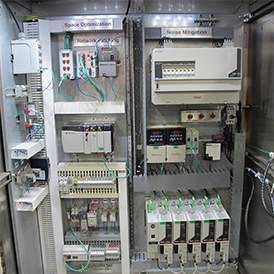The Evolution of PLCs and a Constantly Evolving Industry with David Blake, Electrozad Component Specialist

April 4, 2019
By: Blake Marchand
Born in Saint Johns, Newfoundland, David Blake grew up and currently resides in Windsor, Ontario, David is married to his wife Joyce for 44 years and he works as a Components Specialist for Electrozad. At 68-years young, David is a veteran of the industry, spending the majority of his 40-year career with Electrozad dealing with automation related components, dating back to the introduction of PLCs (Programmable Logic Controllers).
David has three sons. His oldest, Ryan, studied mechanical engineering and is now working in the environmental field in British Columbia. The other two followed him into the industry and have since become two of his customers here in Windsor. Kevin is Electrical Lead for Onward Automation and his youngest, Sean is now a project manager at Select Tool. David noted that despite the many contacts he has developed throughout his career, they both found success in the industry on their own.
“I know a lot of people in this town having worked at Electrozad for 40-years, but they did it all themselves,” he said, “I am very proud and they’re very talented.”
David made his way into the industry initially working for an electrician, “I used to crawl through attics, feed him wire, drill holes, and I kind of got interested in electrical at that point, and he steered me towards an apprenticeship,” he said of his introduction to the industry.
David attended Windsor University, although not enjoying what he was studying he would end up entering an apprenticeship with JIC Electric, a panel shop in Windsor. They would be contracted to wire machinery for some big OEMs (Original Equipment Manufacturers), he explained, building transfer lines for the automotive industry.
David completed his apprenticeship while studying electronics at St. Clair College. LaSalle Machine Tool hired him out of school as a programmer for the machines they were selling to companies in automotive industry like Ford, GM and Chrysler.
“I went out and did start-ups and programming on site at the plants here in Windsor,” he said, “And while I was doing that, I was one of the first people working with programable controllers back in 1978.”
David explained that while he was working with LaSalle, he came across an opportunity to work with Electrozad, which was looking for a technical sales person to sell PLCs to manufacturers. He worked as a technical sales rep for about ten-years, before moving into a marketing and logistic role.
“When I started they called me the black box salesman. No one knew what I was doing here at Electrozad, because nobody was really familiar with programmable controllers,” he said, “so I was out knocking on doors selling, coming up with projects, and all of the sudden Ford and GM built two new plants in Windsor and the specification went out for Allen-Bradley PLCs. From that day on you can understand how everything just rocketed in the electronic fields from the 80’s and part of the 90’s.”
–Typical Rockwell panel Electrozad currently deals with

Around that time PLCs began to really take hold in the industry. As a result, David got busier and busier, and as the products got smarter, David said, “I got excited about it, because my background was always technical and now I had a chance to go back and do technical sales and work on a specialist team.”
As David alluded to, early on he was almost on his own selling PLCs. No one really knew much about them, and the market was still being established. But as the technologies began to improve, becoming more and more intelligent, more manufacturers were utilizing the products and therefore the sector required increased attention from suppliers like Electrozad.
Following his work in marketing, David moved into his current role as a Components Specialist.
“Electrozad was looking for someone to work with the new intelligent products that were coming out of Rockwell [Automation], which had changed completely because the equipment up till then was standard electrical components,” he explained, “Now I am selling sensors and safety equipment, smart intelligent contactors that communicate with other ethernet products, and that’s what I have been supporting technically for the last 20 years.”
What started out as a one or two-person specialist team in the 1980’s, has grown into a twelve-person team, each with a specific area of expertise within the automation segment of the industry.
Whereas initially it was simple products like PLCs, relays, and timers, Electrozad now offers an entire portfolio of Drives, PLCs, HMIs (Human Machine Interfaces), servo motors, motor control centres, etc., and more recently, David noted, we have begun getting into network services and cybersecurity.
The technical support team across their locations in Chatham, London, Sarnia and Windsor is made up of twelve people, supporting the inside and outside sales team by working with clients to determine which products that will best suit their given application.
“It has really evolved,” he said of the industry. “When I use to sell a PLC, it was as big as your desk and only had 4k of memory and the swingarm was the size of your arm, now you’re selling a PLC with tremendous amounts of memory and you’ve even got swingarms that are only as big as one of your fingers,” he said.
“The current evolution is more intelligence in smaller products. We now have I/O Link and Guardlink which are new forms of communication for sensors and safety products transferring data via ethernet to your PLCs.”
The benefit of the communication between machines is information. Their customers are looking for more information that will provide them with empirical evidence for decision making in multiple areas.
“The information that your customers are asking for today is everything from, how can we improve production, how we can make the machine safer, and still keep the cost down and make a quality product.”
With the increased abilities of technology, David admits the industry has become very exciting for someone in his position. With the level of intelligent communication and data transfer from machine to machine to the cloud, companies have performance and diagnostic metrics all the way down to predicting when a piece of machinery may fail. Ultimately, saving crucial dollars by limiting downtimes.
When it comes to challenges on the job, David explained he has experienced a couple different generations of engineer’s that have posed different challenges. Early on, engineers didn’t know too much about PLCs because of how new the technology being used was, and they would lean on people like David working in technical sales, “when I first started their were senior engineers that didn’t know a lot about PLCs, and depended on you to bring them forward ,” he explained, “then they retired and you got another generations in the middle of the 90’s, and that was a challenge because they were on-board with PLCs but computers were getting involved in the industry.”
Although, engineers were educated on the application of PLCs, the technology had continued to evolve, incorporating the simultaneously evolving capabilities of computers added an additional learning curve.
With the latest generation, the schooling has caught up with the industry and engineers are increasingly prepared and they are able to rely on their own expertise. The challenge is to keep the products they have traditionally sold front and centre. “Everyone wants to reinvent the wheel,” David noted, to increase efficiency and cost effectiveness as much as possible.
Despite the challenge of adapting to clients and the changing industry trends, Electrozad has been able to establish a reputable name within the industries they serve and the area they service. Which has contributed to their success becoming Southwestern Ontario’s largest independent electrical supplier.
Due to the nature of the constantly changing industry, life-long learning is a crucial concept, particularly for someone in David’s position. And one David has certainly embraced. The products that were being sold five-years ago, are different than what’s being sold today with the improved intelligence and information sharing. Components continue to decrease in size and increase in capability.
New product platforms will change every three to five years, he explained, “it’s our job as specialists to keep up to date and, hopefully, bring our customers quality products they don’t have time to learn about because they have so much to do at their level, in their company.”
As new product platforms are introduced the technical team at Electrozad relies on representatives at Rockwell Automation to provide them with the requisite training. David said he will also take the odd course if it can contribute here and there.
“If they want to be competitive, they have to keep up with the times,” he added, and that’s exactly what the technical specialists at Electrozad are there to help them do.
When we asked David about the technological advancements throughout his career that have had the biggest impact, the obvious answer was PLCs getting smaller while increasing in memory and computing power, as well as the intelligence and connectivity all components are now capable of.
Clients want information, and as much of it as possible. Ultimately, so that they can produce a better product, with better efficiency and cost effectiveness.
The next area gaining prominence is networks and security. As more information is being generated, and with more components being connected to the internet, ensuring that networks and the devices themselves are secure is imperative.
If someone hacks a particular component or device, “they can get back to the PLC, from there back to the mainframe, and if they’re in the mainframe they can do a lot of damage to a customer’s operations.”
“So cyber security has become very important, and we’re trying to show our customers we have the right products and technical backup to protect them from those hackers,” he added.
As a result, Electrozad now employs a network specialist that can go out to various clients, investigate their networks, uncover any weaknesses and identify the products that will increase their security.
The industry has definitely come a long way. With Industry 4.0, we are in the midst another industrial revolution. One we have only scratched the surface of, despite how far the technologies have progressed. And as Mr. Blake has shown with his long and successful career, embracing that change with a commitment to learning and adapting is crucial within the ever-changing industrial landscape.



